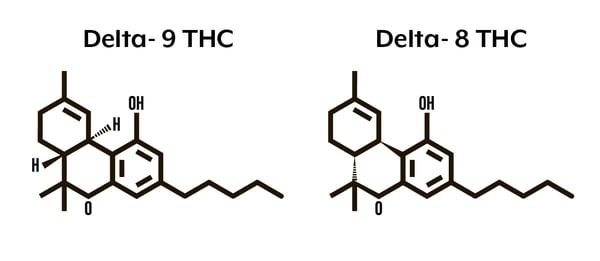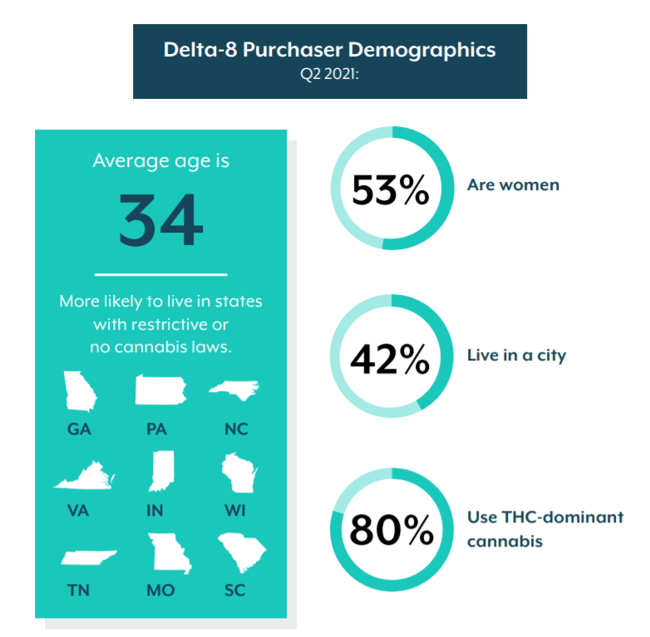Delta-8 THC has been on a wild ride so far.
It snuck up on the CBD and cannabis industries and officially entered the game in late 2020. Now the question of what happens next and whether bigger brands want to jump on this bandwagon is up for debate.
Delta-8 is a variant of the delta-9-THC cannabinoid that everyone is familiar with. Though still psychoactive, delta-8 is reportedly less potent than delta-9. This makes it attractive to consumers who want less of an edge from their high. But unlike delta-9, delta-8 is being sold in CBD-friendly channels like vape shops and specialty retailers. This appeals to consumers in states without legal adult-use cannabis sales who are still looking for psychoactive effects.

Delta-9 and delta-8 THC chemical structures are very similar.
Is Delta-8 Federally Legal?
Hemp production is federally legal, which makes this cannabinoid easy to get in most places – especially online – and why many believe that delta-8 is in the clear. Because it is mainly derived from hemp CBD, it’s technically in a legal gray area, which is sparking conversations about how to proceed with the intricacies. As legal conversations continue, there’s a growing abundance of articles and videos around the web that provide instructions on how to make delta-8 at home.
As of June 2021, twelve states have completely banned delta-8 THC, including Georgia, Pennsylvania, North Carolina, Virginia, Indiana, Wisconsin, and Tennessee. The federal consensus isn't clear on regulatory guidelines, but laws will continue to change on both state and federal levels.
So does delta-8 make you high? There’s an undeniable psychoactive effect, although – just like delta-9 – it will vary for each individual and how it’s administered. But that is where the ambiguity around Delta-8 continues and is increased by a lack of scientific research to understand its long-term effects. Let’s take a closer look at the pros and cons of this minor cannabinoid entering the market and how consumers are reacting to it.
The Potential Behind Delta-8
Delta-8 has the potential to serve populations where recreational cannabis is still illegal. For consumers that have been hesitant about the effects of delta-9, this option can offer a milder experience without the paranoia or panic sometimes associated. High sales of delta-8 are recorded even in states where recreational cannabis is legal. And because it has less tax burden than cannabis, it becomes more attractive to budget-conscious consumers.
The legal ambiguity of delta-8 also provides opportunities to test sales in new markets and channels where delta-9 THC is not permitted.
Further, Delta-8 is an outlet for CBD production companies to market their large or excess quantities of distillate, especially because it offers higher returns than CBD. Politico states, “In January, Delta-8 cost about $1,400 per kilogram, while CBD isolate was selling for about $550 per kilogram.”
The Backlash
The extraction process is not “natural” even though brands claim it is “naturally derived.” As Politico's article states “The vast majority of Delta-8 products aren’t extracted from cannabis. Instead, producers convert plant-derived CBD into Delta-8 THC using a chemical process called isomerization. The process combines CBD with a solvent, acid, and heat to cause the reaction that turns CBD into THC.” And because the FDA has not yet provided any regulations, there is a lack of standardization in lab testing across the board. This means lab results will vary, further inciting the complexities of delta-8.
Cannabis on the other hand is highly regulated and heavily tested before it is put on the market. All it takes is one bad formulation, and delta-8 is vulnerable to the same scenario as the 2019 vape crisis. The current lack of research on the long-term effects of delta-8 and its legal loopholes leaves more to be desired for many to feel safe and trust its place in the industry.
Delta-8’s Impact on the CBD Market
As delta-8 exploded around the country, it found its place in smoke or vape shops and convenience stores. Many are positioning it as a mildly psychoactive product for people without access to legal cannabis, which is popular with one segment of the overall CBD market. The CBD industry has many positionings and can be substituted for anything from a supplement, to a glass of wine, a sports recovery cream, a cigarette, or even cannabis.
As Brightfield's Managing Director Bethany Gomez states;
"The competition CBD is feeling from delta-8 primarily impacts the cannabis and tobacco positioning for consumers who purchase through convenience stores and smoke or vape shops — these two channels together made up 7.3% of the CBD market in 2020. As a result, some CBD brands are feeling a significant squeeze, while others that don't compete in these channels are largely unaffected."
Insights on the Emerging Consumer
In Q2 2021, 23% of American CBD users were aware of delta-8 THC. Half of those who are aware have made a purchase. We consider these consumers early adopters and they are defining what delta-8 is used for — reducing stress and anxiety and promoting relaxation.
Consumers who are likely to purchase have longer CBD usage histories. Being comfortable with CBD through experience, they are more open to trying new cannabinoids.
.png?width=650&name=Q221_US%20CBD_Insights%20Emerging%20Delta-8%20Consumer_Chart%201_FINAL%20(1).png)
Demographics
Young city-dwellers are driving the delta-8 trend. Because it can be bought through legal channels in states where delta-9 is still illegal, it's an affordable and convenient way to experience psychoactive cannabis.

Purchase Channels
Those interested in delta-8 shop at smoke & vape stores and CBD specialty retailers more than the average CBD consumer. Because these channels were the first to stock delta-8, CBD consumers may have already been exposed to the new cannabinoid.
.png?width=650&name=Q221_US%20CBD_Insights%20Emerging%20Delta-8%20Consumer_Chart%202_FINAL%20(1).png)
Why Are People Using Delta-8?
Aside from being a legal loophole to psychoactive marijuana, medical studies show delta-8 is a milder high in comparison.
We previously mentioned that early adopters have looked to it for dealing with stress and anxiety and further data supports this. Mental health conditions are a prominent use case for CBD consumers interested in this cannabinoid—more than the average consumer. Those actively treating mental health conditions with CBD may hope to find additional relief with delta-8. This especially applies to consumers who have used CBD with a higher dosage for a long time.
A high CBD tolerance may lead them to try a different cannabinoid if they haven’t done so already. These CBD consumers looking to delta-8 are more likely to be THC-dominant cannabis consumers; 57% of them use cannabis 5 or more days per week.
.png?width=650&name=Q221_US%20CBD_Conditions%20Treated%20with%20CBD_Chart_FINAL%20(1).png)
As a point of comparison, CBD consumers interested in CBN do not use CBD for the same mental health conditions as those interested in delta-8. Consumers interested in CBN under-index for nearly all mental health conditions while over-indexing for treating no conditions with CBD.
This goes to show there are different consumers interested in each minor cannabinoid.



